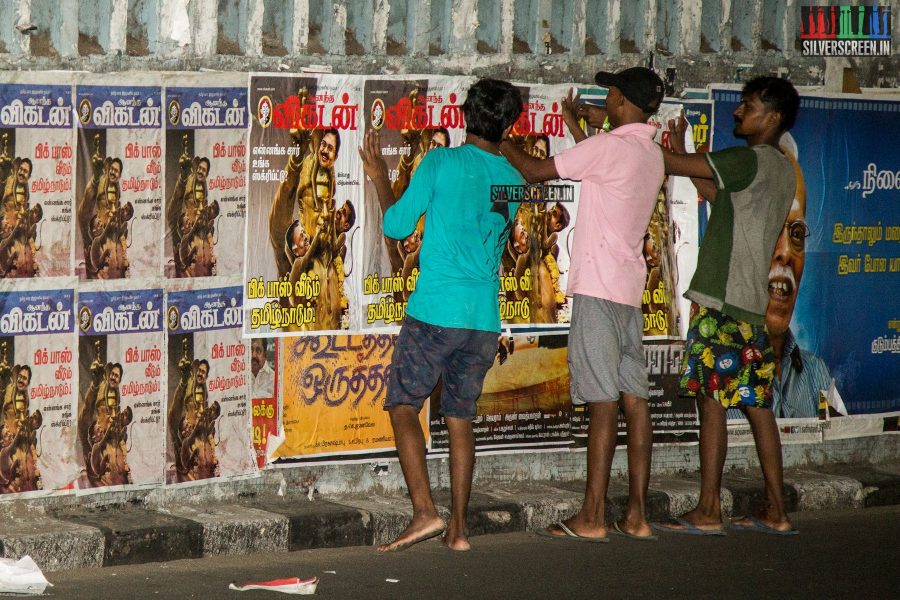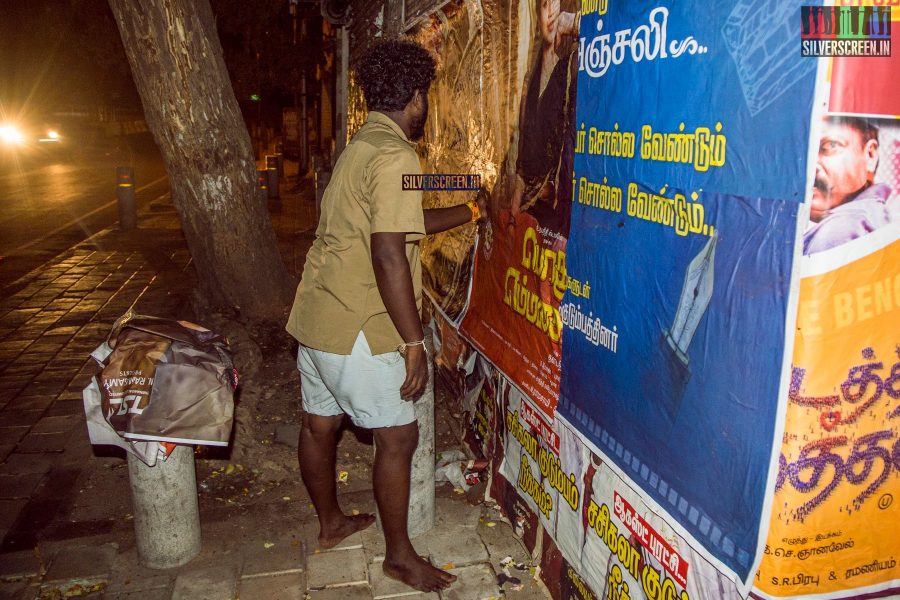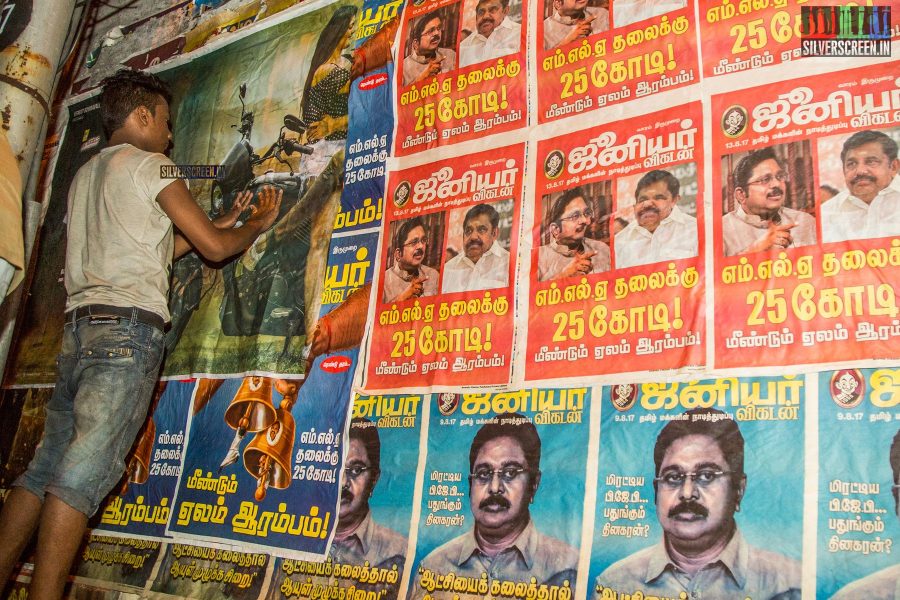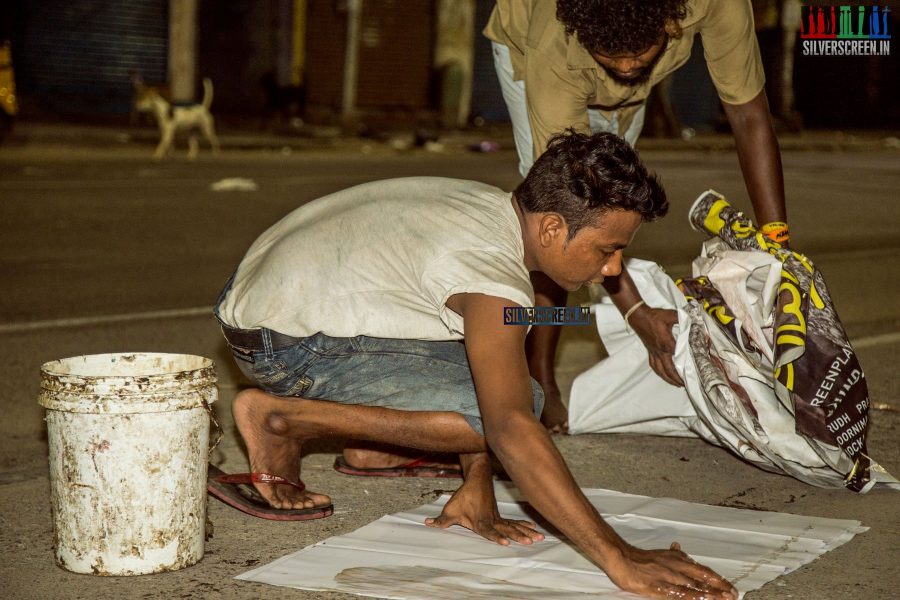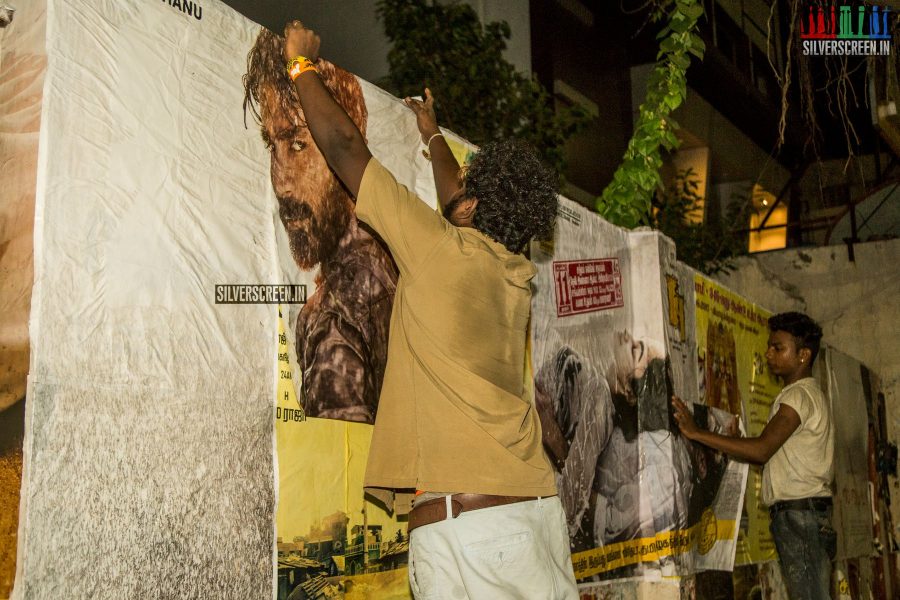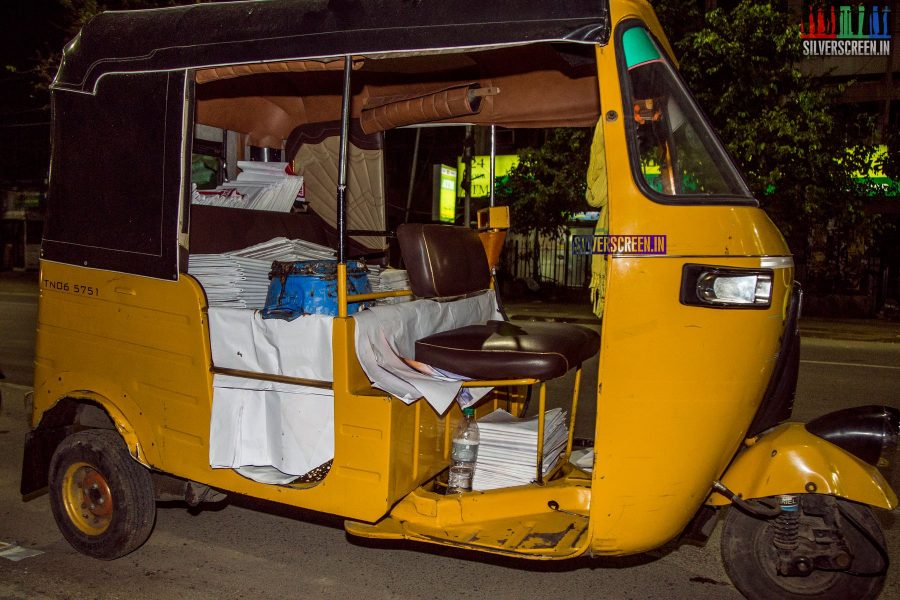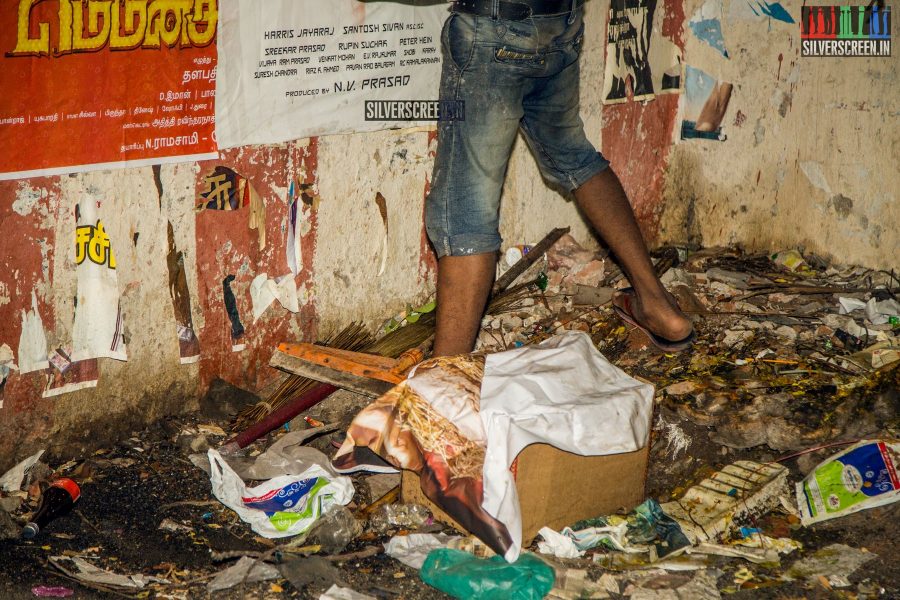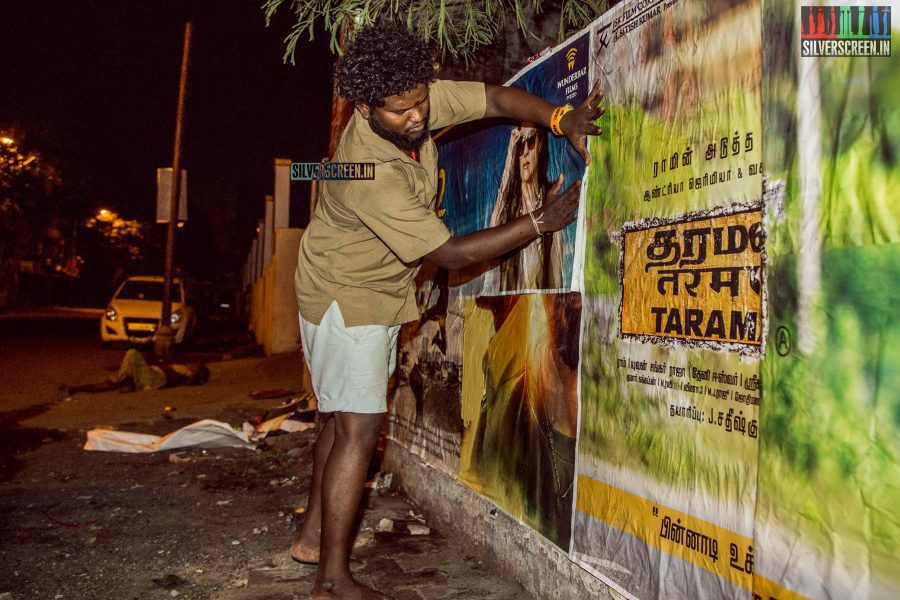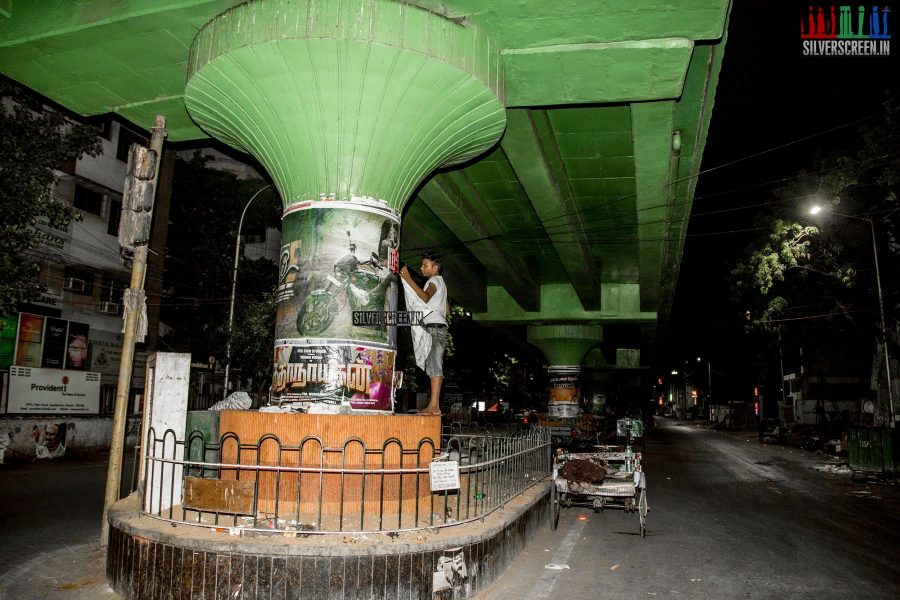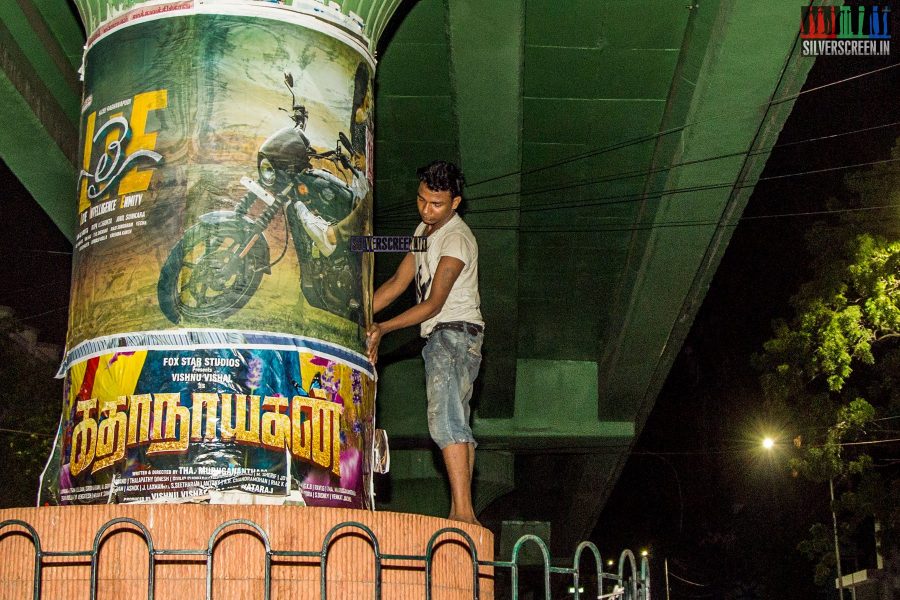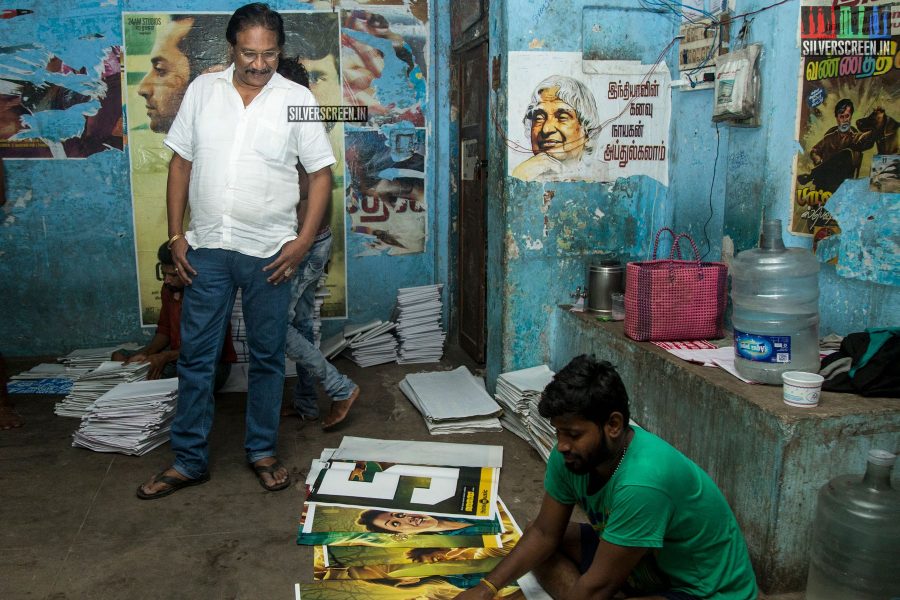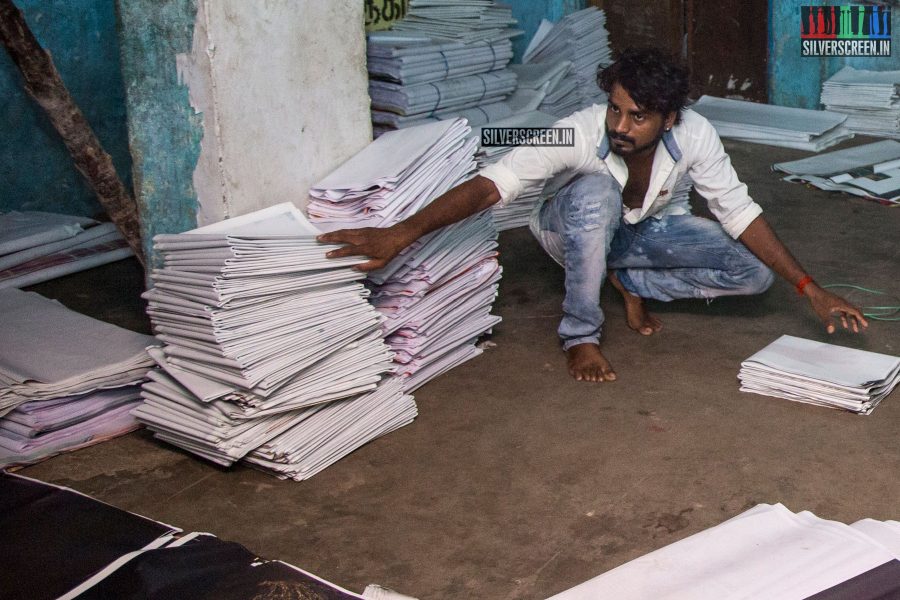Shakthi’s day begins at 10 pm after the film posters arrive from a printing press at Sivakasi. He starts with sorting through the boxes, fitting several pieces of a poster into one, full-length piece.
“Posters usually come in six pieces. Puzzles maari. So, we have to fit them all together when we paste them.”
Each man has his own way of going about his business. Shakthi likes to start from the middle, and figure out the rest of the poster. It’s a job that requires intelligence, not just muscle, Shakthi says with pride. “My father was a labourer. He only used his limbs. But he is happy that I get to use my brain in my job.”
Stacked in the corner of the old worn out office building in Chennai’s Triplicane are old posters of Tamil cinema’s favourite stars. There’s Ajith in his Vedalam avatar, Vijay’s Mersal posters and even one of GV Prakash from his upcoming film, Sema.
Overshadowing them all is a big poster of Rajinikanth from Kaala.
“Thalaivar, madam. He needs to be above all,” Hari, another poster boy, chimes in.
***
During the day, Shakthi and his colleagues can be found sleeping in their homes. “Our job is strictly night shift only. We rarely have anything to do during the day. Sunrise varaikkum velai, sunset ku aprom dhaan ezhundhiruppom (We work till sunrise everyday, so we wake up only after sunset).”
At night, Chennai becomes a playground for Hari and his friends. They ride auto rickshaws to the most populous places in the city, each armed with a vat of glue and several puzzle pieces of posters. Each person has his own area to work, and this rarely changes.
“Initially, a more experienced person comes along with us to monitor and make sure we don’t get into any trouble. In some dangerous areas, we try to go in pairs,” Hari says.
Chennai is peaceful at night, says Shakthi. “But the work we do is so hard sometimes. We want to eat in the middle of the night, but we rarely get to.”
That’s why Shakthi likes it when he’s sent to Adyar to paste posters. “There’s a man who sells Maggi near IIT. I can always depend on him to be there when I am hungry.”
Five years ago, these boys used to be the first to see the promo poster of a film. “We used to be in great demand then. Fans used to ask us to send them pictures as soon as we got the posters. Nowadays, with internet and Facebook, everything has changed.”
***
Hari and Shakthi work for A Nandakumar. He describes himself as a publicity consultant. His family has been in the poster business for over five decades. As such, his family maintains strong ties with much of Tamil film industry’s leading families.
Photo: Dani Charles
Actor Sivakumar is a strong supporter of Nandakumar’s work. As are his sons. “It was through (actor) Karthi sir’s film that I made my acting debut. I was a little worried about being a villain in my very first film (Madras). But otherwise, it was an amazing experience,” he says.
A strange smell wafts over the room. Nandakumar explains, “We make our own glue. We source the powder from local suppliers and boil it in our store for hours. The adhesive is very resistant to water, and is almost impossible to take away.”
Something about the smell also makes it irresistible to cows. “They like the glue, not the poster,” Nandakumar jokes.
The poster business is no longer the most dominant form of film publicity these days. Social media has changed the game, so much so that every year Nandakumar sees a sharp decrease in orders. “There are loyalists of course. Producers like Thanu believe in the poster business and always invest heavily with us. Upcoming producers like CV Kumar too come to us with innovative ideas. But, there is a sharp difference in our cut from the business a decade ago and now.”
Once, Kumar tasked Nandakumar with a 120-feet-long poster. It took most of his men to get it up. But, its size meant that they couldn’t fit it on any of the city’s most prominent spaces. Instead, they had to settle for a less popular locality. “What is the point of so much hard work if it is not visible to people?” he asks.
Nandakumar’s boys get between Rs 600 and Rs 1,000 every day. Only the best and most trustworthy get to work with him. “Loyalty is key in our business. We handle sensitive material and even the slightest mistake can bring about a lot of lawsuits. So, most of the people we hire are people known to us.”
Sometimes Nandakumar is recruited to handle the entire print publicity of a film. “I have contacts across all major newspapers and magazines. I work for films on a contract basis. Sometimes, I am asked to arrange television appearances as well. I’m not a public relations officer, but rather a publicity consultant.”
***
Curiously enough, Hari says that some members of his team don’t know how to read. “In such cases, someone who can read tags along and helps them arrange the poster.”
Nandakumar often asks his team to target the most populous areas in the city. “T Nagar, Anna Nagar, Mount Road, Triplicane, and Egmore are the areas we do most of our work in. In industrial areas like Guindy, we do less work. Of course, it goes without saying that Vadapalani, Kodambakkam, and Virugambakkam get fair business as well. It’s the cinema area after all.”
Nowadays, everyone has been advising Nandakumar to venture into social media. But, he says that while he understands the basics of social media, he doesn’t see himself ever getting into it. “Some think that if I add social media publicity to my existing range of services, then it would be complete. But, I don’t find it a challenging prospect. Posters are tactile, they have substance to them. They’re real and they have some physical presence. I don’t see tweets or posts having the same kind of space.”
His team doesn’t necessarily agree with him, though. “We all have Facebook accounts. Maybe if ayya starts this new activity, we can all join him. Then, we can call ourselves IT officers,” Hari laughs.
******
It’s not just the movies that Nandakumar’s business caters to. His team works in a number of areas, from kanneer anjali posters to promotional ones for political parties. “Mostly, the movie posters only sustain us during the three-days – Friday, Saturday, Sunday. Rest of the time, work is not as glamourous.”
During the recent theatre strike, Hari and his colleagues did not see much in the way of pay. “Nanda sir promised to give us the same salary, but that would mean a huge loss for him. So we came to a kind of compromise. But the very next day, they opened theatres. So the problem vanished.”
*****
